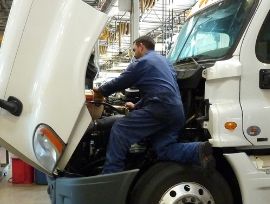A key component of your diesel engine and its performance is the Diesel Particulate Filter. By trapping ash, soot and other particulates from your engine’s exhaust, the filter allows operators to meet Tier 4 emission standards. This critical function of a DPF is why you need to make sure your aftertreatment system is routinely cleaned to avoid an engine shutdown.
Unlike other filters, the particulate filter captures waste gases that leave the engine and become ash or soot. The build-up of those byproducts can have serious consequences on the efficiency and effectiveness of the engine.
Diesel engines are designed to run as efficiently as possible with the minimum amount of ash or soot emitted. If the ash and soot clog the filter, the engine can lose its oxidation efficiency, which can cause backpressure that generates heat and increases fuel consumption.
How it Works
Fuel is introduced into the exhaust flow during either a passive (driving) regen or a parked regen, which can take up to 45 minutes for Detroit Diesel engines and more than an hour for Cummins. The time is based on the Diesel Oxidation Catalyst pressure.
The fuel is burned in the DOC until it reaches a specific temperature, which is usually around 1,200 F. The soot collected is turned to ash and stored in the DPF.
Once the DPF inlet pressure reaches a specific temperature and or a predetermined mileage, which is determined by the EPA, it needs to be cleaned or replaced. Detroit Diesel does not recommend cleaning.
Common Causes of Blocked Filter
The filter captures and stores exhaust soot to reduce diesel emissions. The filters, however, have a finite capacity requiring the soot to be periodically emptied or burned off to regenerate the PDF.
Short trips are the most common cause of blocking filters because the vehicle doesn’t run long enough to burn off the soot. Not following a maintenance schedule or using the improper oil can also cause a blockage in your filter.
Performance modifications, using low quality fuel and frequently running the vehicle on low fuel will also lead to problems with your diesel particulate filter.
Replacement
If regeneration fails to work, replacing the DPF might be the only solution available. Our factory-trained technicians are capable of diagnosing the problem and getting it quickly fixed so that your vehicle returns to being productive.

